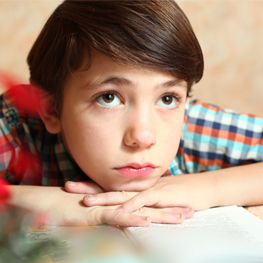
Modern families can’t avoid bad news. Both parents and kids are bombarded with powerful pictures of extreme weather and social violence, and these events can cause overwhelming anxieties. Still, parents need to be ready to talk with kids about scary situations in a sensitive, helpful way. Here’s expert advice on how to do it.
Acknowledge your feelings. First, “it’s important for parents to be in touch with their own feelings about the event,” says clinical psychologist Nerina Garcia-Arcement, Ph.D. You may feel overwhelmed with sadness and fear, and need to tend to your own emotions before initiating difficult conversations
with kids.
Talk to other adults who are your support system and feel your way through things. Get your thoughts in order. And don’t push bad feelings aside too soon. Garcia-Arcement says suppressed emotions may bubble over or lead to deeper psychological problems like depression and anxiety disorders. Getting a grip on your own feelings will allow you to talk with your children in a calmer, more focused way.
Ease into it. If your child doesn’t know a tragedy occurred, think hard before bringing it up. Very young children may not need to know what happened unless the situation directly affects your family. “Kids interpret what they see and hear very literally,” says school counselor Julia Cook, M.A., author of Grief is Like a Snowflake. That’s why it’s important to limit kids’ exposure to media. Each time a child hears or sees the bad news, they may think another tragedy occurred.
When a discussion does arise, start by asking your child what they already know. “Base the information you share on your child’s knowledge and on the questions he asks,” says Garcia-Arcement. Offer just enough information to address your child’s concerns and assure your child they are safe. Avoid giving too many details that could overwhelm both of you.
It is okay if parents cry when they’re discussing tragic events with kids. This models healthy emotional expression, advises Garcia-Arcement. Your tears show kids it is okay to feel sadness and express it in public. That’s an important lesson. Take the learning one step further by labeling your feelings with specific emotion words such as sad, angry, or afraid. This gives kids a richer vocabulary for talking about their own experiences.
Encourage action. Getting back into a normal routine also helps kids cope, says Cook. Spending time with friends and teachers at school stabilizes kids’ environments and strengthens their social networks - the most important determinant of resiliency. Keep your family plugged in to your community through church groups, playdates and activities, even if you’d rather stay home. Withdrawal magnifies distress.
Give your child lots of ways to express their insecurities without words. Hands-on play and art activities can be therapeutic because they allow kids to explore their feelings without the pressure of high-intensity conversations. During play, feelings may be disguised in fantasy or exaggerated in ways you hadn’t expected. Not to worry. Although parents may not understand kids’ playtime behavior, experts say this is the natural way kids make sense of their experiences.
Parents can also help kids regain a sense of hope by offering opportunities to do something about what happened. Kids can make cards to send to families affected by a tragedy or collect money or supplies to donate to aid organizations. “Feeling helpful is a way to regain control and find some normalcy in the midst of chaos,” says Garcia-Arcement. Let each child choose if and how they want to contribute.
Keep watch. Parents shouldn’t assume kids have moved past a tragedy just because they aren’t talking about it; take note of pronounced behavior changes such as decreased appetite, sleep disturbances or aggression. After a tragic event, young children may regress to a previous stage of development, says Garcia-Arcement. They may develop intense separation anxiety, start wetting their pants or say they’re afraid of the dark, even though they’ve been sleeping with lights out for years. Trust your intuition as a parent. Kids’ reactions to trauma vary enormously.
Some kids will try to avoid talking about what happened, and Cook says that is perfectly fine. “Never force a child to ask a question or to talk about an incident until he is ready,” she says. Create a loving, supportive environment with lots of hugs and together time. Kids may not need to discuss things directly to feel a sense of comfort and safety.
Be aware. Emotions can resurface and even intensify long after a tragedy passes. Check in with your child periodically by asking how they are feeling about the event. This will help you gauge how well they are coping and remind them you are willing to talk about it. Kindle a spirit of openness and compassion so your child knows they can share anything that’s on their mind.
Reach out for professional help if your child:
Heidi Smith Luedtke, Ph.D., is a personality psychologist and mom of two. She is the author of Detachment Parenting: 33 Ways to Keep Your Cool When Kids Melt Down.
Calgary’s Child Magazine © 2024 Calgary’s Child